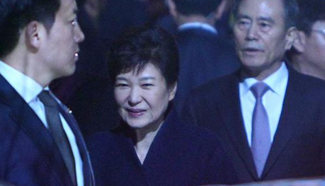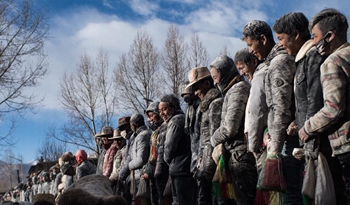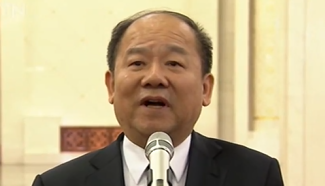by Xinhua Writer Liu Si
BEIJING, March 12 (Xinhua) -- The type of globalization is changing largely because of the rise of China and the "globalization 2.0" is more about investment, infrastructure and development rather than just trade in the old times, an Indian-born Canadian scholar on globalization has said.
Amitav Acharya, writer of the popular book "The End of American World Order," published in 2014 and translated into Chinese, told Xinhua in a recent interview, when teaching at Schwarzman Scholars Program at Tsinghua University here.
All the globalization was basically driven by the West and now the new globalization will be driven more by the East than the West, said Acharya, also the Boeing Company chair in International Relations and former president of the International Studies Association.
"This globalization will be led by the East, China in particular and others like India, and it will be based on south linkages," he said.
For Acharya, this is not a prediction but it is happening now. He listed several trends to illustrate his point.
One is from the economic perspective, which is that the relative share of the Western world GDP is declining and by 2050 the developing countries could account for 60 percent of the world GDP.
Secondly, the pattern of international trade is shifting away from north-north trade among the developed countries to south-south among developing countries.
Connected with trade, investment is also an indicator. Acharya said that Asian countries minus Japan have been the largest source of foreign investment in the world, and during the last 10 years, the biggest investment in the world was from East Asia.
If you look at these trends, It will not be difficult for you to imagine future globalization is moving away from the West toward the East, he said.
Particularly pointing out China's role in globalization, Acharya said that China's biggest push to globalization is construction of infrastructure.
"Infrastructure is not only about trade but also about development," he said, adding that China now invests more outside than it receives from outside and China is building the Belt and Road and the Asian Infrastructure Investment Bank.
He was referring to the China-led construction of the Silk Road Economic Belt and the 21st Century Maritime Silk Road with the aim of building a trade and infrastructure network connecting Asia with Europe and Africa along ancient trade routes.
The AIIB was established in 2015 and started operation in January 2016. With 57 signatory countries and authorized capital of 100 billion U.S. dollars, it aims to provide financing for infrastructure improvement in Asia as a "lean, clean and green" bank.
Figures can tell. China's outbound investment surpassed inbound funding in 2016. According to official data, China's non-financial outbound direct investment soared 44.1 percent to 170 billion U.S. dollars and Chinese companies invested in 7,961 overseas enterprises in 164 countries and regions in the past year.
Besides, China's combined imports and exports with countries along the Belt and Road topped 6.3 trillion yuan (about 912 billion dollars) in 2016, up 0.6 percent from 2015.
Noting that it will be a different stage of globalization, Acharya said that investment and infrastructure relations are much deeper and more suitable for developing countries, because they need infrastructure before they need trade. "That means the future globalization is moving more towards economic development in infrastructure rather than trade."
Commenting on the Western globalization, which was backed by military intervention or use of force in the past like colonialism, Acharya said "globalization in the last 40 years has been eroding state sovereignty."
"If it is led by countries in the East, like China, it will be more respectful of the political identity and sovereignty of other countries, and will be more geared to development not just trade," he said, "It's very different globalization."
Speaking of challenges, Acharya said that China will surely face problems from some countries, "just like everybody who invests in another country."
He said different cultures and management styles may make it difficult for companies to operate in other parts of the world. "But it can't create permanent barriers because Chinese companies will learn and develop partnerships with local companies."
"The globalization is not over...China will have much more influence in shaping the globalization than in the past. But China is not going to be the global hegemony," he said. Enditem












